Wesleyan University Celebrated its 192nd Commencement, Sunday
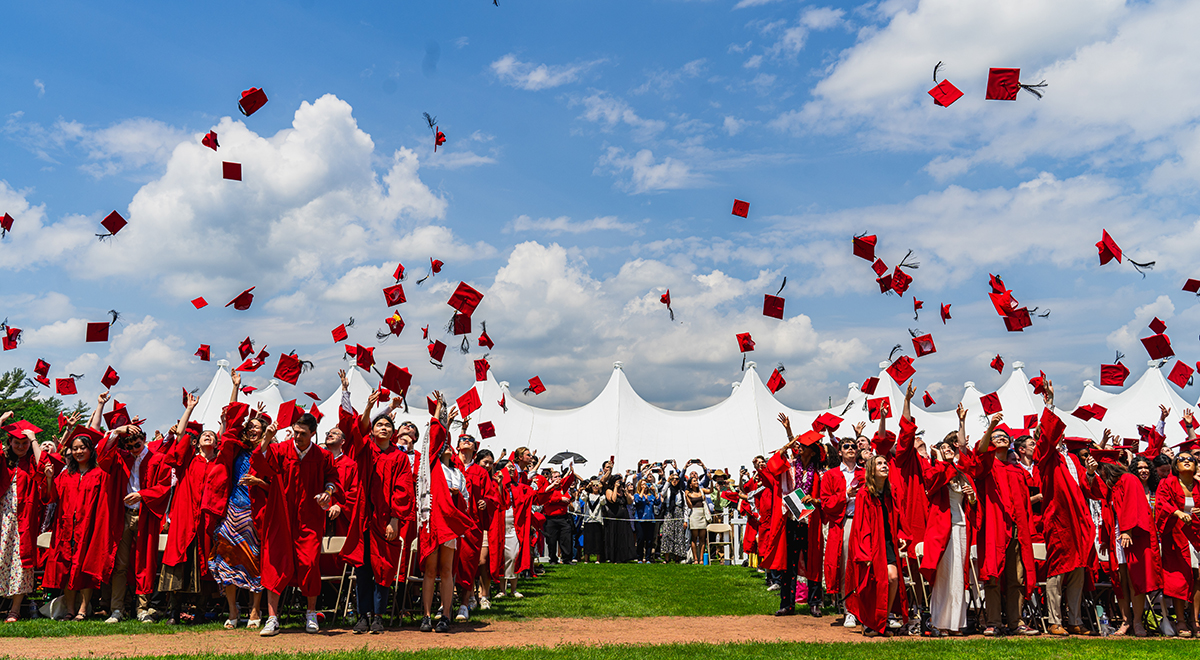
With the symbolic – and celebratory – tossing of their graduation caps, Wesleyan University’s Class of 2024 cemented the closing of one chapter of their lives and the opening of another during the University’s 192nd Commencement ceremony Sunday. It was the perfect punctuation to a day steeped in history and uniquely Wesleyan customs.
As so many Wesleyans had done before them, the graduates and recipients of advanced degrees assembled on the University’s iconic Foss Hill for the procession to Andrus Field, where the main order of the day, the conferral degrees, would take place. Under sunny skies, they gathered in excited friend groups, posed together for pictures, and responded to the occasional congratulatory hug from a family member or friend who pulled one or another of them away for the personal moment.
At the appointed time, President Michael S. Roth ’78, on behalf of the University, conferred Bachelor of Arts degrees to 758 graduates and Bachelor of Liberal Studies degrees to seven graduates as well as 37 Master of Arts degrees, 19 Master of Arts in Liberal Studies, one Master of Philosophy in Liberal Arts degree and six Doctor of Philosophy degrees
Wesleyan also awarded honorary degrees to three luminaries in their fields – Raj Chetty, renowned for his studies of higher education and social mobility, Michael Greenberg ’76, P’14, one of the world’s most distinguished neuroscientists, and Imani Perry, a 2023 MacArthur Fellow and distinguished Harvard University professor, who delivered the commencement address.
As Jack Devlin ’24 waited on Foss Hill for Commencement to get underway, he reflected on his time at the University and what it was like coming to Wesleyan during the COVID-19 pandemic, a period in which he lost out on a lot, including a high school graduation.
“Coming into Wesleyan, I had extremely high hopes, and I’ll be frank, because of the world situation it was really tough for everyone to be able to make it through. I had many friends that could not even go to school their freshman year. I had the blessing of being able to get that college experience my freshman year and you know what? Wesleyan is a place where I came here for athletics, for lacrosse, and to get an amazing education … and to just become a well-rounded human being,” Devlin said, adding that being at Wesleyan has taught him to navigate outside of his social circle, which has made him a more confident person.
Devlin was not the only member of the Class of 2024 who recognized the personal impact of the Wesleyan experience. Adriana Bollinger ’24, who majored in theater, took a few moments to reflect on some of the important lessons she learned from her time at the University, too. One of them stood out among the rest: “The greatest lessons I learned at Wesleyan outside of the classroom is that authenticity is what is conducive to good work. Being yourself and bringing all of yourself to what you’re making and what you’re doing and who you’re meeting, it creates like the most satisfying outcomes always,” she said.
Meanwhile, Emma Sean Flaherty ’24 also talked about some of the lessons she learned at Wesleyan.
“The greatest lesson I learned outside the classroom was to slow down, because I’m always someone that wants to do things right as they get them, whether that be academic or personal or social. So just learning that I have time and to enjoy this time in my life and taking things day by day or minute by minute has been really helpful for my time here,” said Flaherty, who added that her graduation from Wesleyan means she is one step closer to her dream career of being a curator at art museum.
“There’s a lot of school required for that so just having this one step closer to that journey is really important for my future goals and aspirations,” Flaherty said. She will begin work at an art museum soon.
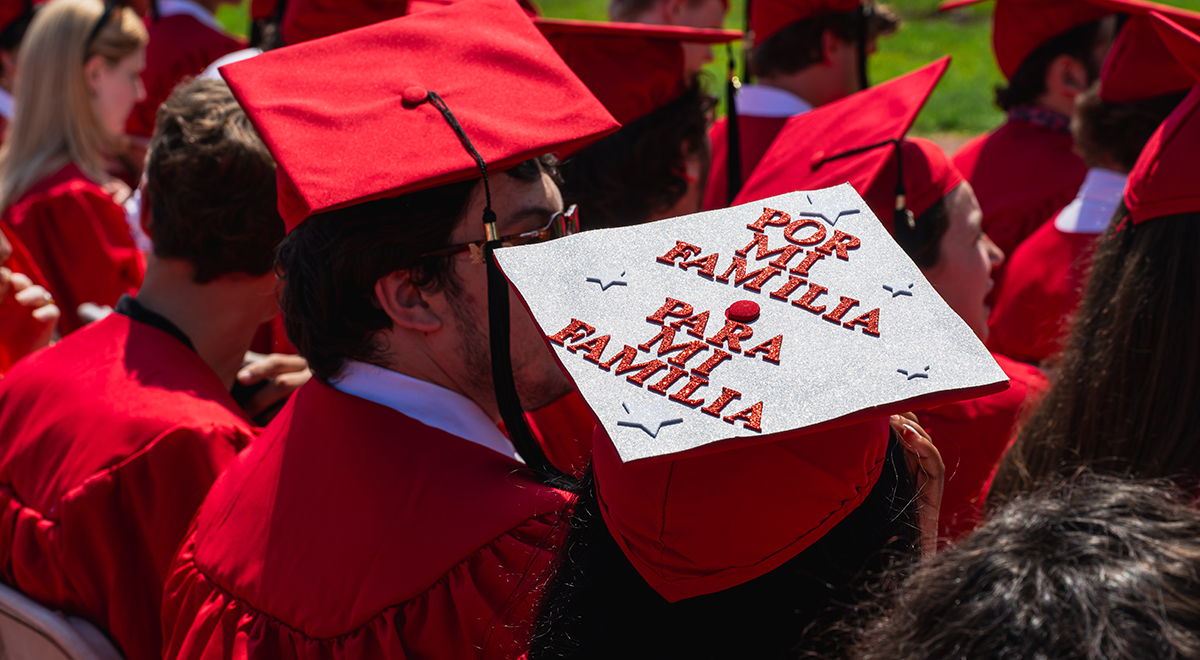
Like Flaherty, Lynn Choi ’24, who majored in psychology, sees the greatest lesson she learned out of the classroom within the context of her classroom work. For her, that lesson was time management.
“Even when you’re not studying, you really have to know what you’re doing,” Choi said. “If you’re working, you have to balance it with your social life. It’s really easy to focus on one or the other I feel.”
Looking to the future, Choi said she will be proud to be part of Wesleyan’s Alumni network.
“I think that will kind of give me the sense of being supported and being a part of the group even if I’m not obviously at Wesleyan,” she said. “It will be nice to feel that sense of belonging and know that I am part of a group of people who, although they may be spread out across the country and the world, I still went to the same school as them and went through a lot of the same experiences. So I think I’ll always have that sense of belonging.”
For Nigel Hayes ’24, Commencement was as much about his family as it was about him.
“The fact that I’m graduating from college, for my family and for myself, means years of work, but also a new step and a new direction, for not only the future of my family but also the history for all things that they’ve been through already,” he said. “As immigrants themselves to the country from the island of Grenada, it means a continuous of that, a growth of that, a new chapter.”
After they were assembled for about 45 minutes, it was time for the Class of 2024 to file into place for the procession to Commencement. In a cascade of cardinal red caps and gowns that swayed slightly in the breeze, they walked to the field. Those who earned post-graduate degrees followed behind in black robes that represented their alma maters, followed by Wesleyan faculty.
Once they were all in their designated positions, Roth opened Commencement with his customary exuberance, “Members of the faculty and staff, distinguished guests, new recipients of graduate degrees, and the mighty class of 2024 — I welcome you to the 192nd annual Commencement of Wesleyan University.”
Following President Roth’s welcome, each speaker echoed his celebratory tone and, in their turns, delivered unique graduation remarks. But their speeches shared a common theme, too: the strength and richness of Wesleyan University and the broad arts education it provides equip the University itself and its graduates to do great things in the world.
“You have had the good fortune to attend an exceptional university albeit at a difficult time with the world still reeling from the effects of the COVID pandemic, wars raging, and the society undergoing seismic changes,” said Michael Greenberg, who graduated from Wesleyan nearly 50 years ago. “Despite the turmoil in the world that we are still facing, I fervently hope that you have been able to experience fully the wonderful things Wesleyan has to offer: a broad liberal arts education, classmates who have challenged you to think in new ways, professors who have inspired you, and fantastic experiences and friendships made outside of the classroom that have been life changing and may ultimately last you a lifetime.” (Read Greenberg’s speech in its entirety.)
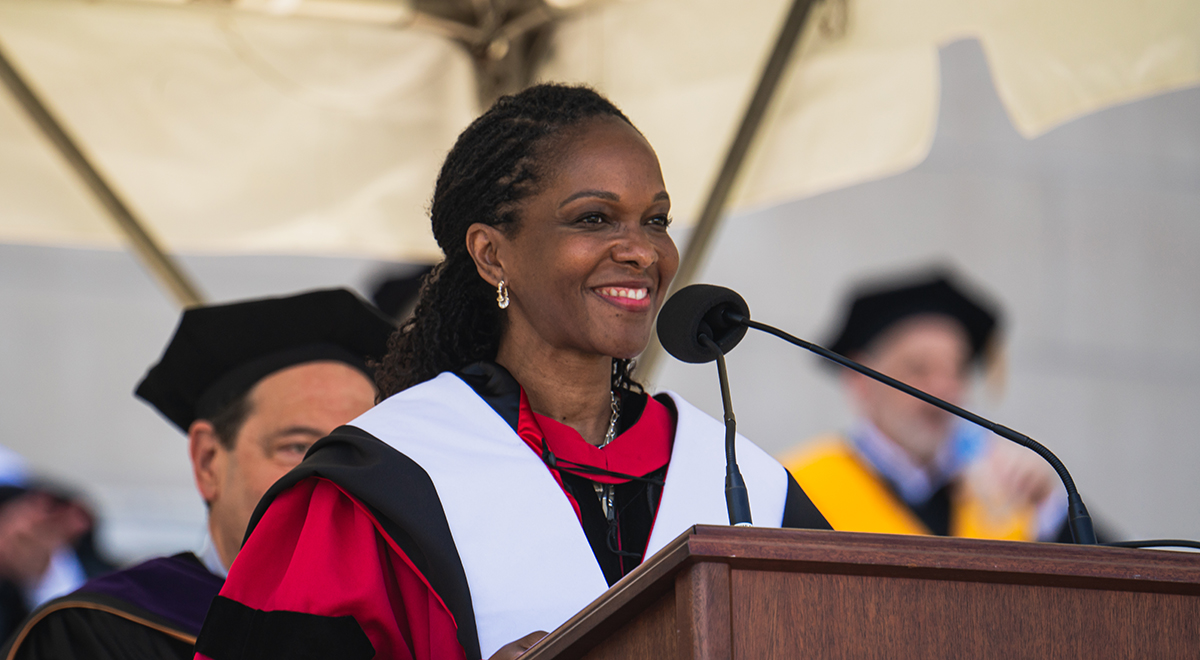
During her Commencement Address, Imani Perry emphasized the superior education the graduates will be taking into the next phase of their lives and encouraged them to lean into the Wesleyan tradition and determination of making a difference in the world. “You have a great deal to contribute, and I want you to make that contribution at the highest level. Do not be overly concerned about the size of your impact, whether it’s splashy or widely recognized. Rather focus on the depth of your integrity and the sincerity of your efforts,” she said. (Read Perry’s speech in its entirety.)
Part of their charge, Perry told the graduates, will be to understand the parts they each will play in the legacy of their alma mater — and to act accordingly. “Wesleyan is not simply the place that will sit at the top of your resume, you are now a part of its legacy. That is a serious responsibility. Refuse the inclination to separate the title “Wesleyan graduate” from the other parts of you: your hometown, your culture, and so forth,” she said. “Just as all of those things are part of you, all of what you are is now part of Wesleyan because you will be a living representative of this place and you have a hand in its reputation in the world.”
President Roth delivered complex remarks for a class graduating during a complex time. He talked of demonstrations and protest and urged the new graduates to think deeply and learn thoroughly about the causes they champion. “Demonstrations … should push you to inquire how complex issues have developed over time to have different impacts on different groups of people,” he said. “Being a student — at whatever age — means being open to others in ways that allow one to expand one’s thinking, to enhance one’s capacities for appreciation, for empathy and for civic participation.”
He also reminded graduates that they have the power to confront threats to the American freedoms that have been leveled through attacks on democracy, higher education and rule of law. “We can fight back,” Roth said. “Between now and November 5th, many of our students, faculty, staff, and alumni will be practicing freedom by participating in the electoral process. They will work on behalf of candidates and in regard to issues bearing on the future of fairness, inclusion, free speech, and the possibilities for full engagement with others.”
Speaking on behalf of their class, Ruby Clarke ’24, described the apprehension they had four years ago about leaving behind their mother and the comfort of small-town life to come to Wesleyan where they knew no one. But, they came. They leaned into the kind of curiosity that characterizes most Wesleyan students. And they, said, they learned to care, to love and to act out of love. (Read Clarke’s speech in its entirety.)
“When students like myself stand up in front of their peers with a microphone quite like this one, though not as loud, to fight for what is right and just and kind, we do so out of love. When Wesleyan’s Afro-American Society took over Fisk Hall in 1969, it was a radical act of love and resistance, demanding the care and curiosity of the University be extended Black students,” Clarke said. “In 2000, when the United Student Labor Action Coalition conducted a 33-hour-long sit-in in the Office of Admission to secure better working conditions for contractors on campus, it was a radical act of resistance and love. … We fight because we care, because Wesleyan matters to us.”
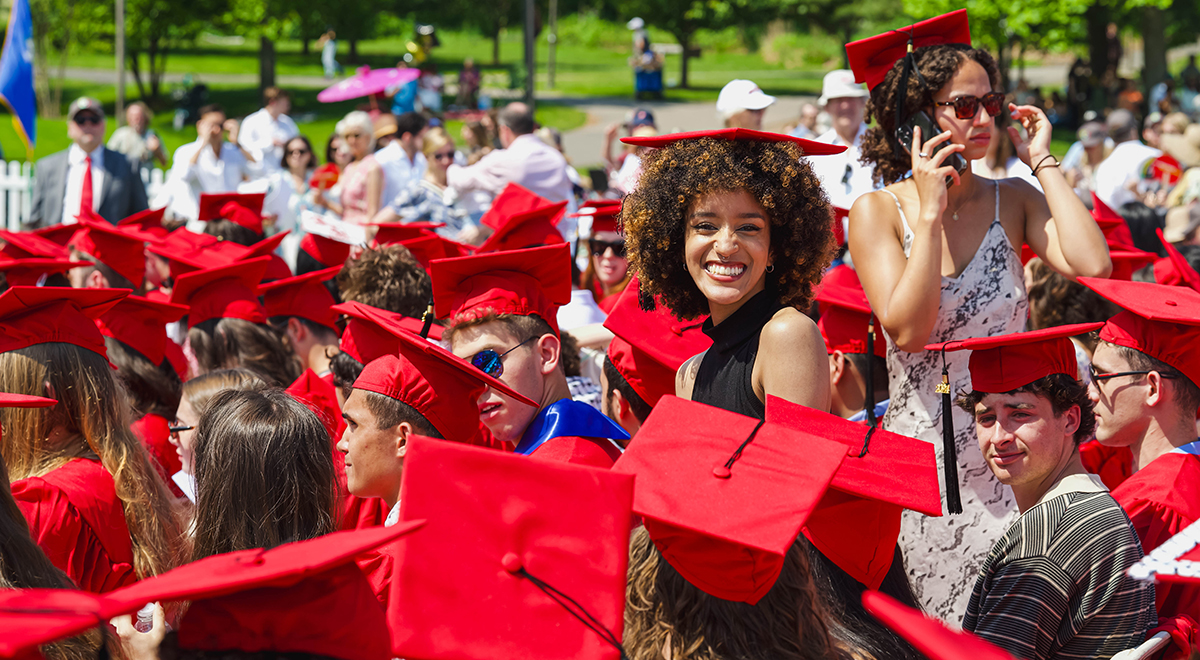
After accepting his honorary degree, Raj Chetty, explained that his personal experience and research at Harvard bear out that education provides a clear pathway to a better life for the people being educated — and for generations of their families. But, he noted, the problem is, access to educational opportunity eludes many. (Read Chetty’s speech in its entirety.)
“Opportunity matters. And education is one of the keys that opens the doors of opportunity. Unfortunately, access to those opportunities is not evenly distributed. There are numerous talented kids in America who don’t get the opportunity to attend high-quality schools and colleges like this one,” Chetty said. “Wesleyan has been a leader in increasing access to higher education, seeking to admit more highly qualified students from low- and middle-income families and eliminating factors such as legacy preferences that can serve to perpetuate privilege across generations. Our research shows that such efforts to expand access to opportunity – when implemented on scale across colleges and other institutions in America – can make the American Dream of upward mobility more of a reality for everyone.”
Before the ceremony drew to a close, Shaykh Jamir Meah, a University chaplain, delivered a blessing to the graduates that both addressed the challenges the world faces and the world’s need for more of the Wesleyan touch. “Graduating class of 2024: you have blessed us with your intelligence, compassion, energy, creativity, and courage. Now, as you step beyond these walls, the world is in desperate need of these very qualities. There is no more capable cohort for this undertaking than Wesleyan graduates,” he said, in part.
“Be like stars—guide others through turbulent storms. Like stars, help others navigate to shores of stability and safety. And like stars, illuminate the darkness with the brilliance of your light, offering hope to all.”
On Sunday, the University also recognized several retiring faculty members for their service to Wesleyan and awarded three faculty members with the Binswanger Prizes for Excellence in Teaching.
Caitlyn Ferrante ’24 Graduated Before NCAA Tournament Competition
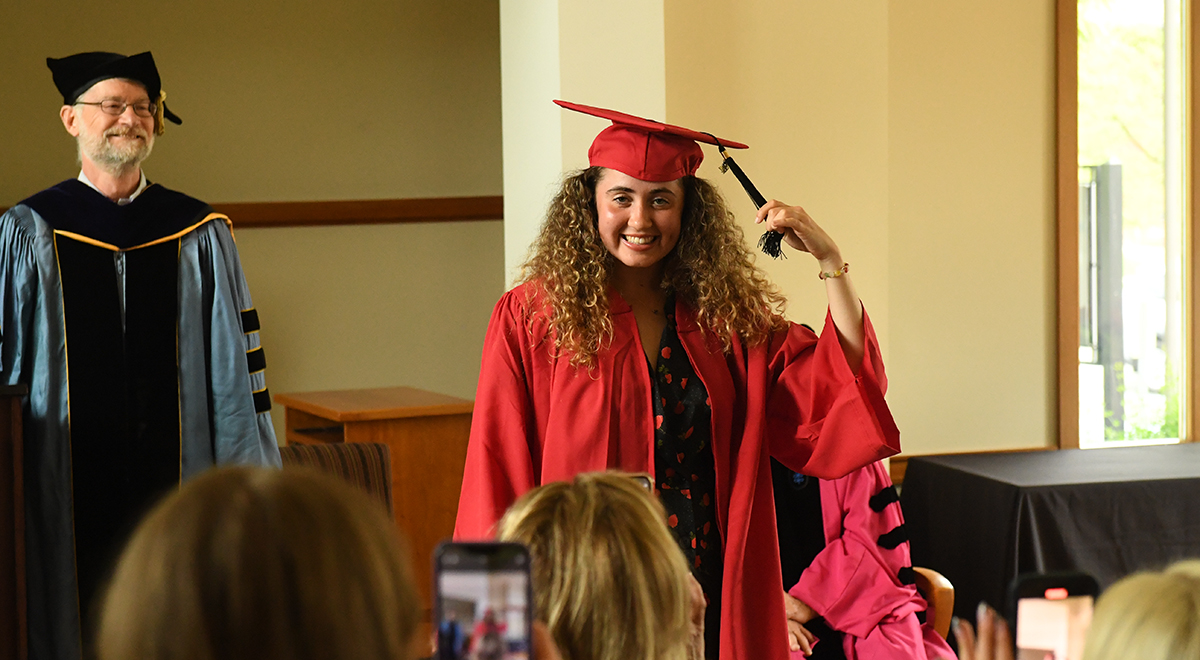
Commencement came early this year for Caitlyn Ferrante ’24 of the women’s tennis team, for the best possible reason. She was in St. Louis Sunday preparing to compete for Wesleyan in the team phase of NCAA Tournament and the singles and doubles brackets that will take place between May 25 and 27.
Ferrante received her bachelor’s degree as a double major in English and Government during a special ceremony in the McKelvey Room at the Office of Admission on Friday, May 17. Her family, teammates, and coaching staff, along with Director of Athletics Mike Whalen ’83 and Wesleyan’s Faculty Athletics Representative to the NCAA Fred Cohan, attended.
“Caitlyn has been an instrumental part of our team for four-plus years,” said Head Coach of Men’s and Women’s Tennis Mike Fried. “She’s been through the ups and downs of normal seasons plus a pandemic and has been as resilient as anybody and her impact on the program can’t be understated. It’s really gratifying to see her lean in and enjoy every bit of this last season for her and play her best tennis.”
While Ferrante previously competed in the NCAA Doubles Bracket, this will mark her first appearance in the NCAA Singles Tournament.
Maxx McNall contributed to this story.

